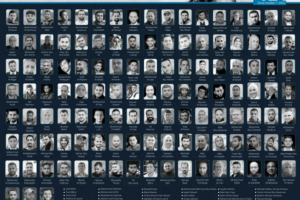Sanctions, suppression and self-censorship. Israel plunges to record low in World Press Freedom Index

An infographic shows images of 173 journalists killed in Gaza since October 2023
Ido David Cohen reports in Haaretz on 3 May 2025:
Israel dropped 11 spots in the 2025 World Press Freedom Index to a rank of 112 out of 180, as published by Reporters Without Borders (RSF) on Friday. This marks the lowest ranking for Israel since the index began in 2002.
In 2022, before the current government came to power, Israel was ranked 86th in the world. This year, it falls into the second-lowest rating out of five to describe the state of press freedom, from “good, satisfactory, problematic, difficult and very serious.” Israel was rated “difficult.”
Of Israel, the RSF wrote: “Press freedom, media plurality and editorial independence have been increasingly restricted in Israel since the start of the war in Gaza, launched by Israel on 7 October 2023 following the deadly Hamas attack.
Close to 200 journalists were killed in 18 months in Gaza by the IDF and pressure on journalists in Israel has increased. Disinformation campaigns and repressive laws have multiplied in Israel and pressure on Israeli journalists has intensified,” the explanation said.
The index also provides background on the Israeli media landscape: “In 2023, the far-right Channel 14 became the second-most watched TV channel in Israel, following Channel 12. Ynet is the most widely read news site in the country, and the daily newspaper Haaretz has considerable influence despite limited readership and despite the pressures its journalists face.”
The report mentions Communications Minister Shlomo Karhi’s plan to privatize or shut down the public broadcaster Kan and to consolidate political control over broadcast regulators.
It also highlights the country’s political context: “Politicians have significant influence over appointments to the broadcasting regulatory bodies. Since 2021, only journalists working for Channel 14, a media outlet that covers Prime Minister Benjamin Netanyahu in a favourable light, have been granted interviews with the country’s leader, who accuses the Israeli press of conspiring against him.”
The index continues: “In 2024, the communications minister called on the government to boycott Haaretz, one of the few newspapers to criticise Netanyahu’s policies, including the massacre of civilians in Gaza, a topic that is largely suppressed,” and made note that “only journalists embedded with the IDF are allowed to enter the enclave.”
The report adds that “Journalists identified as Arab face more intimidation while working and foreign journalists are experiencing increasing difficulty obtaining accreditation.
“Since the start of the war in Gaza, the authorities have intensified repression against journalists, especially against foreign and Israeli journalists whose coverage of the war deviates from the government’s narrative. A harsh nationalist discourse regularly dominates media coverage, drawing out diverse viewpoints in the overall coverage of the conflict.
The index notes a marked shift in journalist safety before and after October 7: “Before the attack by Hamas on October 7, attacks by organised crime and police brutality during protests were the main concerns in terms of journalists’ safety.
“Crackdowns on journalists covering anti-government protests have intensified, while an increasingly nationalised media discourse is pressuring journalists critical of the authorities to self-censor. Online smear campaigns and propaganda aimed at discrediting the media and journalists are not uncommon. Dozens of journalists arrested in Palestine are being held in Israeli prisons without trial.”
Palestine is also included in the index, with a press freedom situation described as “very serious.” RSF defines Palestine as including both the West Bank under Palestinian Authority control and the Gaza Strip.
It dropped six places this year to 163rd out of 180, mainly because “Palestine has become the most dangerous country in the world for journalists,” due to the high number of journalists killed in Gaza. In the West Bank, journalists face pressure both from the Palestinian Authority and from Israel, which has intensified its presence there since October 7.
Qatar ranks 79th, up five spots from last year. While most of Israel’s neighbors rank lower, Israel is drifting further from the scores of Western democracies, and has been overtaken by several African nations it once outranked, including Chad (108), Guinea (103), and South Sudan (109).
The top-ranked countries are Norway, Estonia, the Netherlands, Sweden, and Finland, and the U.K. rose three places to 20th. The U.S. fell two spots to 57th, which the index categorizes as a “problematic” situation, the middle tier of the index.
Reporters Without Borders is an international NGO based in Paris, founded in France in 1985, that works to promote and defend press freedom.
This article is reproduced in its entirety
